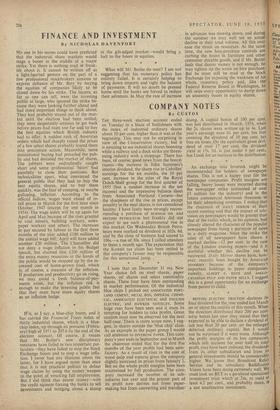FINANCE AND INVESTMENT
By NICHOLAS DAVENPORT
No one in his senses could have predicted that the industrial share markets would stage a boom in the middle of a major strike. Yet there is nothing mad or-freak- ish about it. It cannot be written off as a light-hgarted gesture on the part of a few professional stockbrokers anxious to express defiance of Mr. Baty by buying the equities of companies likely to be closed down ,by his strike. The buyers, as far as ape can tell, were the investing public at large, who ignored the strike be- cause they were looking further ahead and had more important things to think about. They had probably stayed out of the mar- ket until the election had been settled; they were desperately anxious to get back before prices had risen too far and to buy the best equities which British industry had to bffer. A sudden rush of American orders which had sharply raised the prices of a few select shares probably scared them into precipitate action. Meanwhile, some institutional buying had preceded the pub- lic and had denuded the market of shares. The jobbers were undoubtedly caught short and some professional 'bears' had painfully to close their positions. But technicalities apart, what convinced the general public that they had to buy the best equity, shares, and to buy them quickly, was the fear of creeping, or maybe galloping, inflation. According to the official indices, wages went ahead of re- tail prices in March for the first time since October, 1947 (except for one month in 1954). The wage index will be up again for April and May because of the rises granted to coal miners, building workers, news- paper workers and others. The increases in pay secured by labour in the first three months of the year added £180 million to the annual wage bill; April will have added another £20 million. The Chancellor did not deny a wage inflation in his Budget speech, but claimed that £200 million of the extra money resources in the hands of the public would be mopped up by the in- creased cost of home-grown food, which is, of course, a measure of the inflation. If production and productivity go on rising, we may avoid a fresh balance-of-pay- ments crisis, but the inflation risk is enough to make the investing public feel that they must have more equity shares as an inflation hedge.
If is, as I say, a blue-chip boom, and it has carried the Financial Times index of thirty industrial shares, which is a blue- chip index, up through its previous (Febru- ary) high of 197} to 207.6 by the end of the election account. Of course, it means that Mr. Butler's new disciplinary measures have failed in two important par- ticulars—they have failed to stop the Stock Exchange boom and to stop a wage infla- tion. I never had any illusions about the latter, for I have argued more than once that it is not practical politics to defeat wage claims by using the money ' weapon to the point of wrecking full employment. But I did think that dearer money—with the credit squeeze forcing the banks to sell investments and bringing about a slump
in the gilt-edged market—would bring a halt to the boom in equities.
What will Mr. Butler do next? I am not suggesting that his monetary policy has entirely failed. It is certainly helping to bring down imports and right the balance of payments. It will no doubt be pressed home until the banks are forced to reduce their advances. In May the rate of increase
in advances was slowing down, and during the summer we may well see an actual decline in their total volume. All this may ease the strain on resources. At the same time, the new hire-purchase controls are curbing the boom in furniture and other consumer durable good's, and if Mr. Butler feels that dearer money is not enough, he may tighten up the screw on hire purchase. But he must still be mad at the Stock -Exchange for exposing the weakness of his whole monetary policy and, like the Federal Reserve Board in Washington, he will seize every opportunity to damp down an unseemly boom in equity shares.










































 Previous page
Previous page